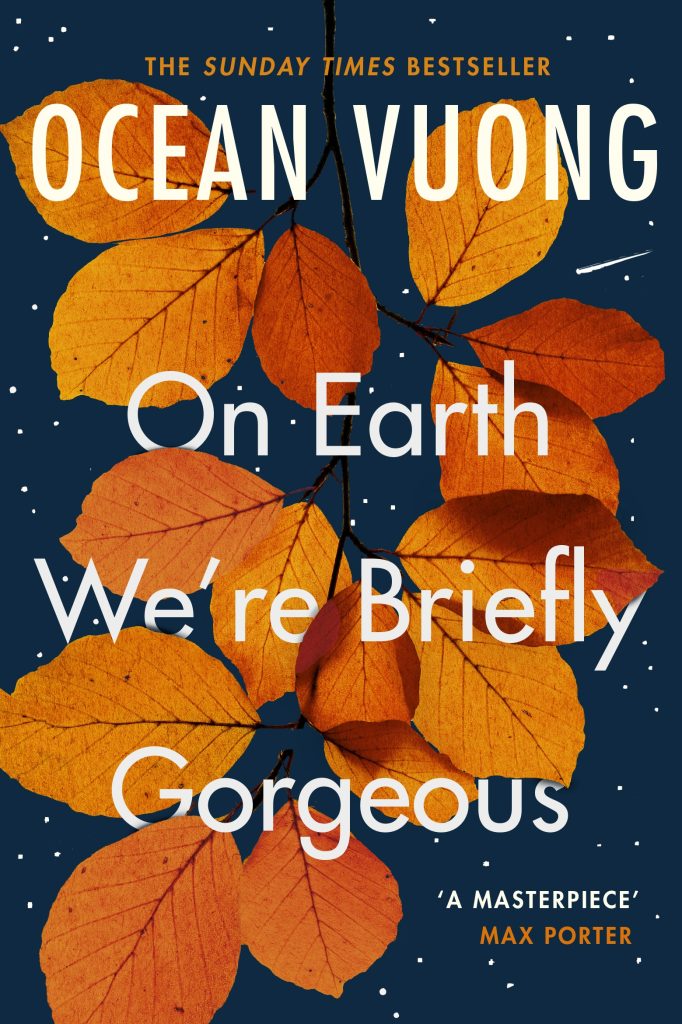FEATURE ARTICLE -
Issue 101: September 2025, Reviews and the Arts
Author: Ocean VuongPublisher: Vintage (imprint of Penguin Random House)Reviewer: Stephen Keim
Ocean Vuong is a Vietnamese American poet. He was born in Ho Chi Minh City in 1988. The chronology hints at the complexity of his heritage. His mother’s father was a United States soldier and his maternal grandmother was Vietnamese. But, by the time then Saigon fell, Vuong’s grandmother was alone in Vietnam with her partner stuck back in America.
Vuong’s mother was pregnant with him when she was 18 and working in a salon washing men’s hair to make ends meet. Her mixed race heritage made it illegal for her to work in Ho Chi Minh City and it was necessary for her and her young son to leave Vietnam for the United States.
Briefly Gorgeous is Vuong’s first novel and was first published in 2019. Its list of prizes is impressive including being long listed for the PEN/Hemingway Debut Novel Award.
Vuong’s reputation as a poet is very strong. His 2016 collection, Night Sky with Exit Wounds, won the Whiting Award, the Forward prize for the Best First Collection; and the TS Eliot Prize.
Briefly Gorgeous is an epistolary novel. It commences “Let me begin again. Dear Ma, I am writing to reach you …” And, though the narrative curls into the detail of many corners of the epistle writer’s life such that the words may not seem quite so directed to and for the benefit of his mother, the reader never quite forgets that this is a letter and the text returns, from time to time, to more directly addressing itself to Ma.
There is an irony to the letter form in that the narrator’s mother is revealed to have never learned to read in English. The irony deepens when one finds from sources external to Briefly Gorgeous thatVuong’s mother died of cancer shortly before the book was published. The irony adds meaning to the continuation of the words quoted above: “… even if every word I put down is one word further from where you are.”
All autobiography is, at some level, fiction. By deciding what stories to tell and which ones to leave out, the writer decides upon the impression they wish the reader to receive about the writer’s life. For that reason, Briefly Gorgeous is a novel. But every external and internal indicator suggests that both the novel and much of Vuong’s poetry is deeply autobiographical.
Briefly Gorgeous is a lot about names. Vuong is nicknamed by his grandmother, Lan, as “Little Dog” and the name sticks. Lan, who suffers from bipolarity, named herself Lan (which means “orchid”) when she ran away from home, aged 17. Her family name was the comparatively boring “Seven”.
Lan named her daughters Mai and Rose continuing the flower theme. The best name story, however, starts with Rose, Vuong’s mother, who worked in unhealthy conditions and for low pay in a nail salon, telling a co-worker that she planned to go to the beach. Her accent made the word sound like “bitch” much to the amusement of the co-worker who then explained that it might be better to refer to the coastline as “the ocean”. Rose so loved the sound of “Ocean” that she renamed her son to make his given name, Ocean. And, as the reader can see from the cover of Briefly Gorgeous, this name has stuck, as well.
Briefly Gorgeous is a family memoir as much as it is a personal memoir. It emerges early in the text that Rose’s form of discipline of her son involves slaps and hits. Lan who is close to Little Dog tries to shield him from the worst of that violence. It only ends when Vuong is 13 years old when he is big and confident enough to insist that it does not continue.
Lan gets her grandson to remove her emerging grey hairs with a pair of tweezers. His reward for that and other kindnesses to his grandmother is to be regaled with stories of the past. It is these stories which allow Briefly Gorgeous to chronicle the struggles of Lan and Rose, in the years before his birth, in war torn and then post war Vietnam.
Briefly Gorgeous is the story of a specific Vietnamese American experience. The bulk of Vuong’s own experience emerges and plays itself out in down town decaying Hartford, Connecticut. Once famous as the insurance capital of the world, Hartford, according to Briefly Gorgeous, has, with the coming of the internet, seen the companies take their office staff off to places like New York leaving behind poverty and joblessness.
(Indeed, the modernist poet, Wallace Stevens, managed to write his brilliant poetry while working in Hartford as an insurance executive.)
It was in this decaying Hartford that Vuong and his family conduct their struggling existence.
Briefly Gorgeous is a story of a family. It is about the relationship of a child and his mother and grandmother living a difficult existence in a country which is, in many respects, alien to each of them. It is about holding things together and the importance of love and family loyalty.
Briefly Gorgeous is also a coming of age story. Vuong is bullied dreadfully at school but, somehow, manages to survive. As well as the difficulties of being Vietnamese (yellow) in working class America, Vuong also had to cope with being gay.
Much of Briefly Gorgeous is about a first love affair. Working on weekends and holidays as part of a tobacco picking crew on a farm, an hour’s bike ride out of Hartford, Vuong meets Trevor, the grandson of the farm’s owner. Their relationship is told with clarity and beauty. Trevor’s relationship with his alcoholic Dad; the journeys they take in and around Hartford on bike and in Trevor’s Dad’s old utility truck; their varying tastes in music; and their love making in the shed where the drying tobacco is stored is shared in intimate detail with the reader.
Vuong’s prose is sparse and precise. Incidents are narrated simply. Hardship and pain suffuse the text. But a sense of Buddhist acceptance prevents sadness from ever taking over, completely. It is not at all surprising to find that Vuong is a brilliant poet. Briefly Gorgeous could be understood just as appropriately as a prose poem as it is as a novel. When one reads Vuong’s poems, one finds the same feeling of beauty tinged with sadness as one finds in Briefly Gorgeous.



